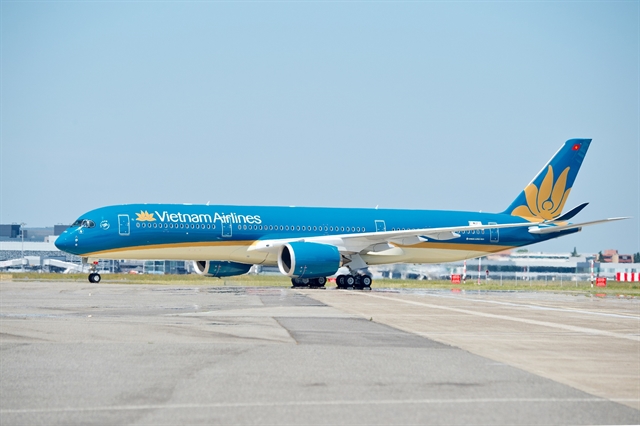.jpeg) Economy
Economy


|
| Vietnam Airlines have raised the salaries of pilots to enhance competitiveness in the domestic aviation market. — Photo Vietnam Airlines |
HÀ NỘI — Vietnam Airlines Corporation has decided to increase the salary of pilots on Boeing B787 and Airbus A350 by 22 per cent, nine months ahead of schedule.
The pay rise was announced in the context of a fiercely competitive aviation market and shortage of pilots.
A pilot and instructor who fly 85 hours a month will have a new monthly salary of VNĐ116 million (US$5,000), increasing by VNĐ21 million, while a co-pilot earns VNĐ56 million, up VNĐ10 million.
This salary does not include other income items such as title salary, responsibility allowance, flight supervisor allowance (if any), overtime pay, telephone, stationery and aviation security money.
Thus, if increasing the salary by VNĐ21 million for pilots and instructors and VNĐ10 million for co-pilots, the average income is VNĐ229 million and VNĐ136 million, respectively.
CEO of Vietnam Airlines Dương Trí Thành said the earlier pay rise is part of great efforts by the corporation, aiming to ensure the income level for pilots in the face of constraints from management mechanisms, especially strict regulations on salaries and bonuses under the guidance of competent authorities.
“To the extent permitted, Vietnam Airlines has made efforts to improve the salary, bonus and special preference policies applicable to the aircraft pilots,” Thành said.
On June 1 this year, Vietnam Airlines reformed the salary for Vietnamese aircraft pilots, in which the net income of Vietnamese pilots and instructors is equal to 75 per cent of foreign counterparts, while that of co-pilots equal to 65 per cent of their foreign counterparts.
“We will continue to implement wage reforms until 2025,” Thành said.
A source told VnExpress that although the 2019 salary had not been announced, the income for pilots at Vietjet ranges between VNĐ140 million and VNĐ240 million. For Jetstar Pacific, this figure is between VNĐ100 million and VNĐ180 million.
According to Vietnam Airlines, it takes four years to train an A321 pilot and seven to eight years for an A350, with high training costs. The average income of each pilot is about VNĐ150 million per month.
The carrier is operating 115 aircraft, with more than 20,000 employees. About 1,200 are pilots, of which 800 were trained by Vietnam Airlines.
A report by the Civil Aviation Authority of Vietnam shows that Vietnamese airlines are operating more than 170 aircraft. The figure is expected to rise to 250 units in 2020, with an annual increase of about 200 pilots.
Concluding a governmental conference in June this year, Prime Minister Nguyễn Xuân Phúc asked that the establishment or expansion of airlines must ensure the maintenance and improvement of aviation safety, as well as the ability to supply human resources including pilots, engineers, and repair and maintenance staff. — VNS